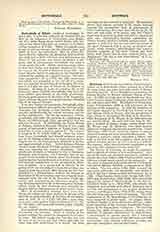

Goulburn (GULBURNENSIS), Diocese of, one of the six suffragan sees of the ecclesiastical province of Sydney, New South Wales, Australia. Goulburn, the episcopal city (population in 1901, 10,612), bestrides the Sydney-Melbourne railroad at an elevation of 2071 feet above the sea. The diocese has an excellent climate, and a fertile soil, that is devoted to agricultural and pastoral pursuits, and to the cultivation of the vine, for which it is eminently suited. It is watered by the three principal rivers of Australia, the Murrumbidgee, flowing through the middle of the diocese, and the Murray and the Lachlan on the southern and the northern boundaries respectively. The Barren Jack Reservoir (situated in the heart of the diocese) will, when completed, be among the largest bodies of conserved water in the world, with a capacity equal to that of Sydney Harbour, will be capable of irrigating several million acres of fertile land, and by promoting closer settlement and intensive cultivation, will in time make the Goulburn diocese the garden region of the great island-continent. The political and commercial importance of the region is also enhanced by the selection of the Yass-Canberra district, which is entirely within the diocesan borders, as the site of the future federal capital of the Australian commonwealth.
The two first resident priests of Goulburn were Fathers Fitzpatrick and Brennan, whose pastorate extended from the coast to the Murray River. Goulburn formed part of the See of Sydney (q.v.) till 1864, when it was formed into a separate diocese. Dr. Bonaventure Geoghegan was translated thereto from Adelaide, but died in Ireland in 1864, without having taken possession of the newly-created see. His successor was Dr. William Lanigan (consecrated at Goulburn, Pentecost Sunday, 1867). He was the first Australian bishop consecrated in his own cathedral, and was an ardent promoter of Catholic education. He died June 13, 1900. His successor (consecrated coadjutor to Dr. Lanigan, July 7, 1895), is Dr. John Gallagher, the first priest ordained for the diocese (November 2, 1869). On his arrival, in 1870, there were in the diocese five priests. In November, 1908, there were 59 priests (51 seculars, 8 regulars), 24 parochial districts, 8 Christian Brothers, 279 sisters (187 Sisters of Mercy, 49 Presentation Sisters, 43 Sisters of St. Joseph), 2 orphanages for girls and 1 for boys, 1 college for boys, 5 boarding schools for girls, 64 primary Catholic schools (supported by voluntary contributions) with 4250 children in attendance, and a grand total of 5000 children receiving the benefits of religious education. There is a parochial school in every district throughout the diocese where over thirty children can be brought together. Catholics constitute one-third of the population of the diocese which is one of the best equipped in Australia.
HENRY W.CLEARY

